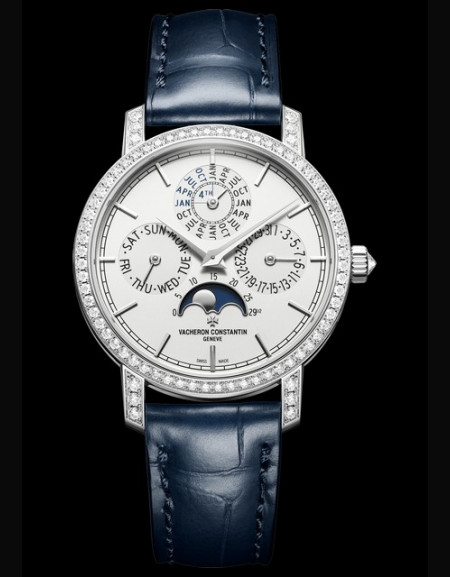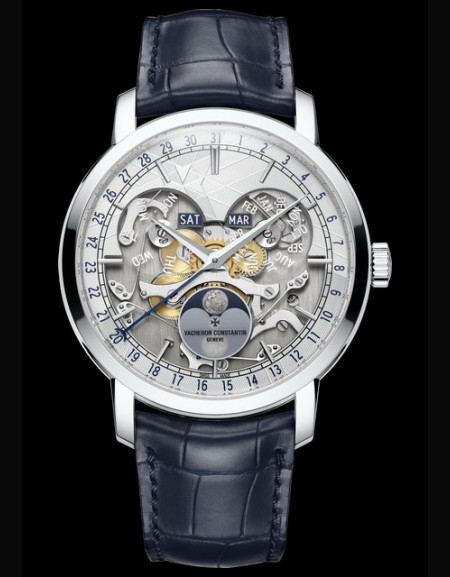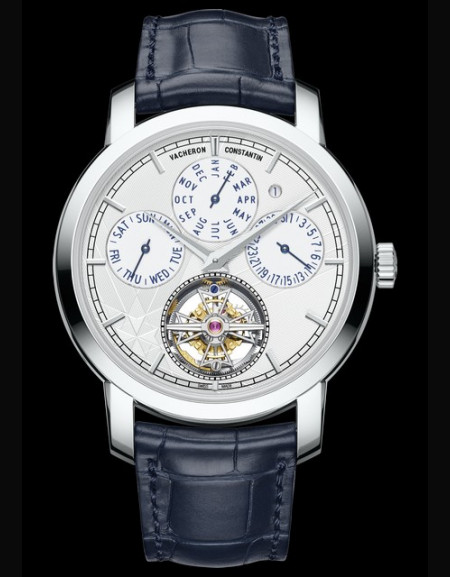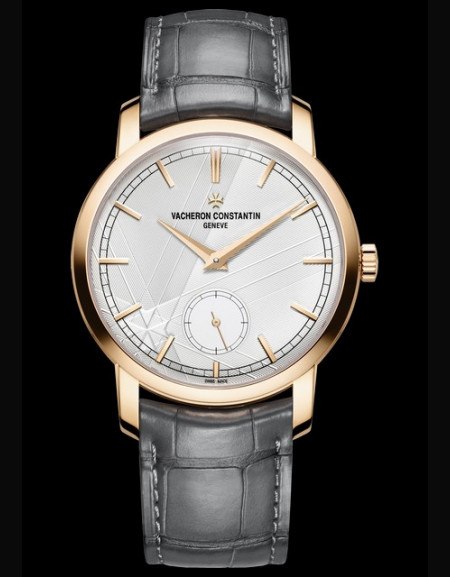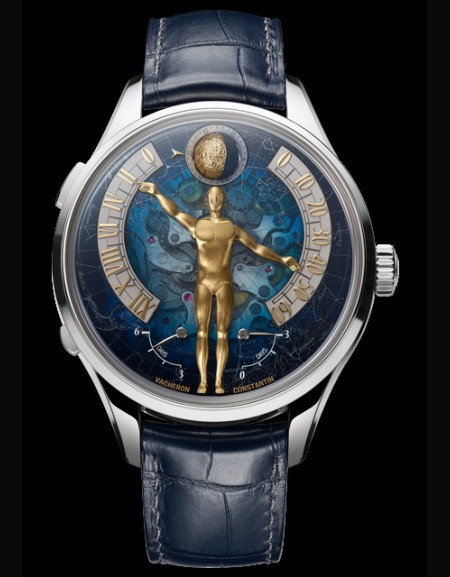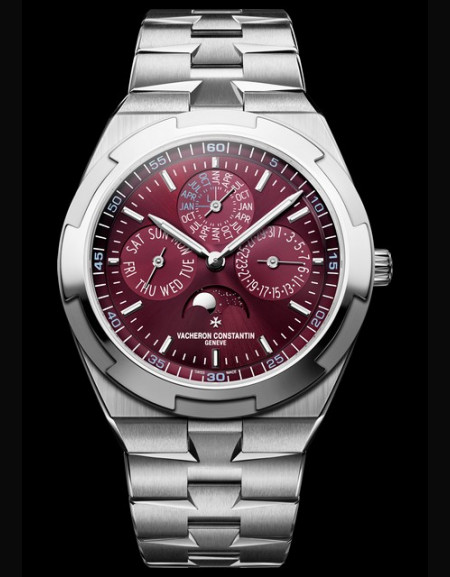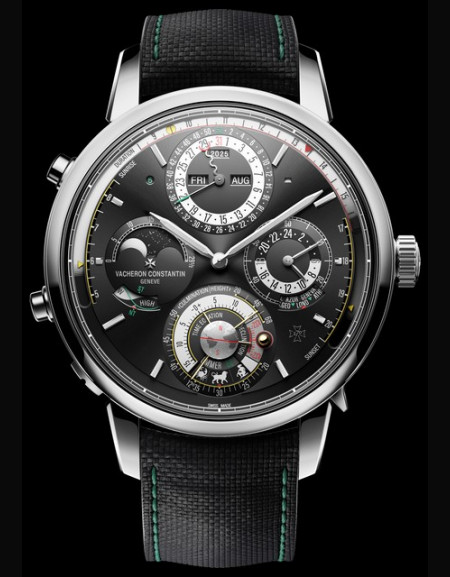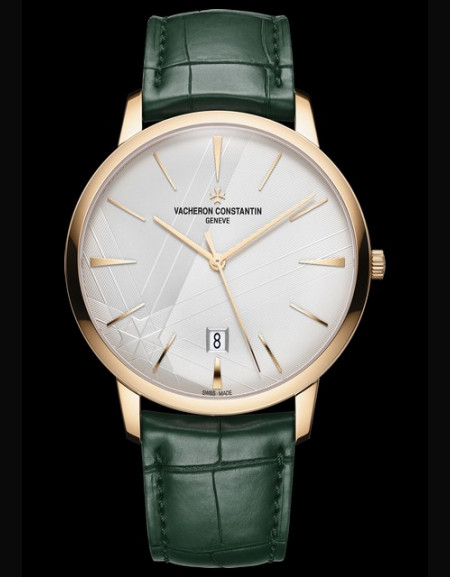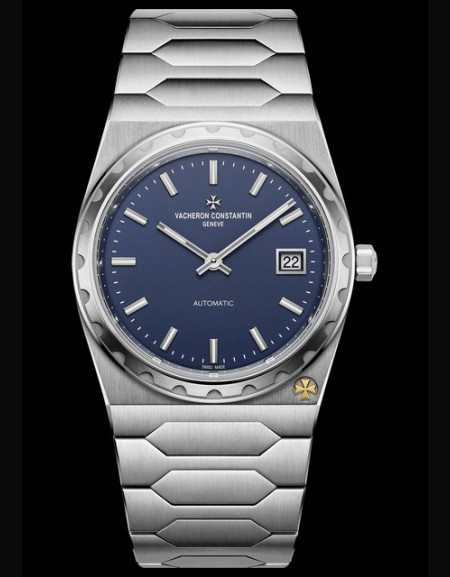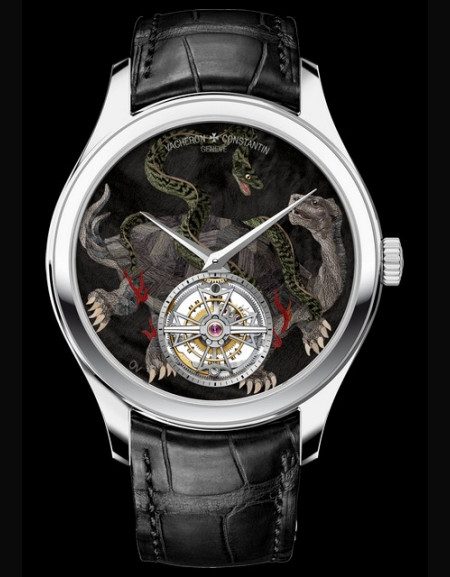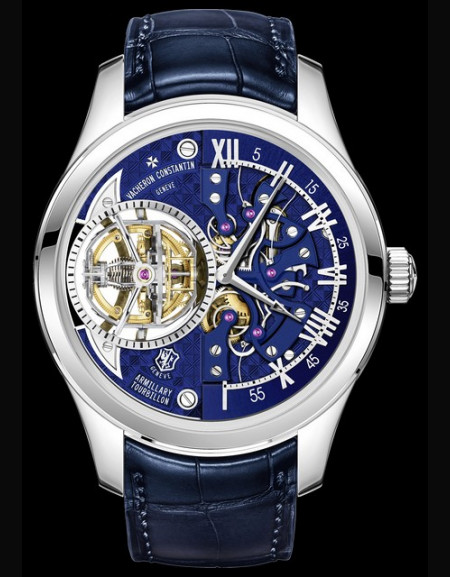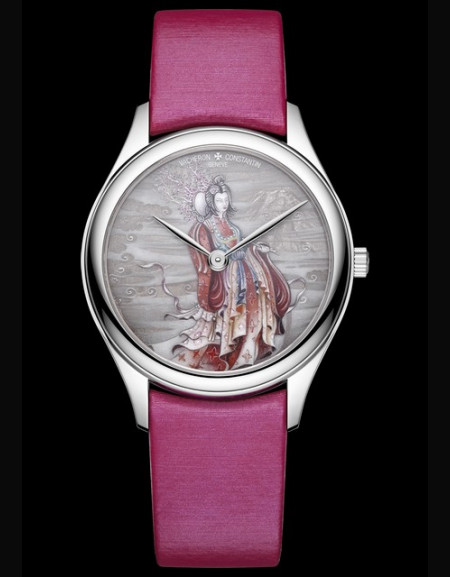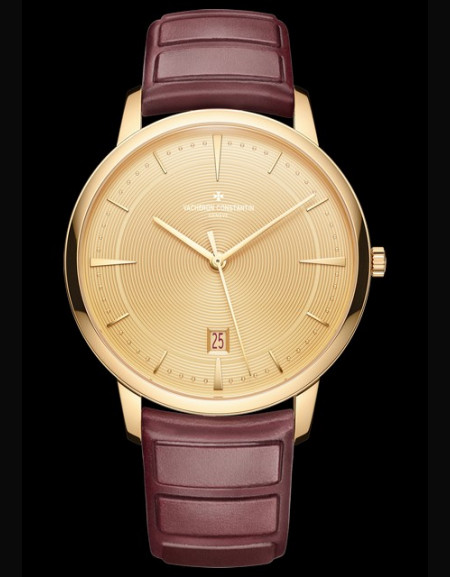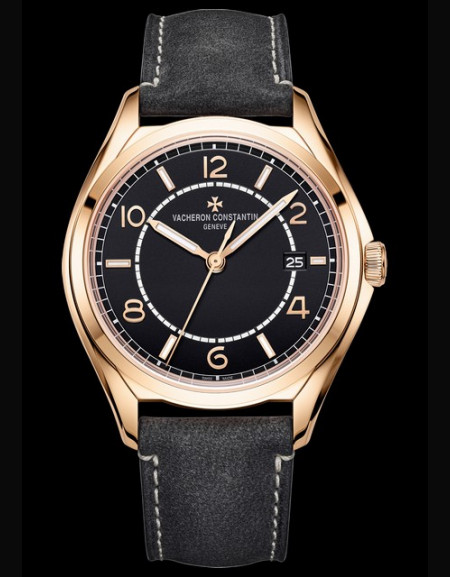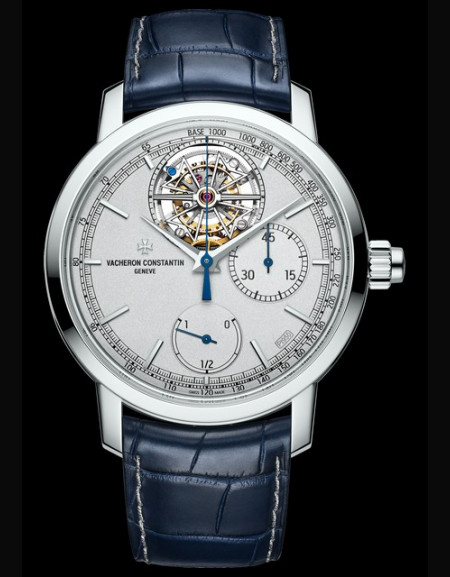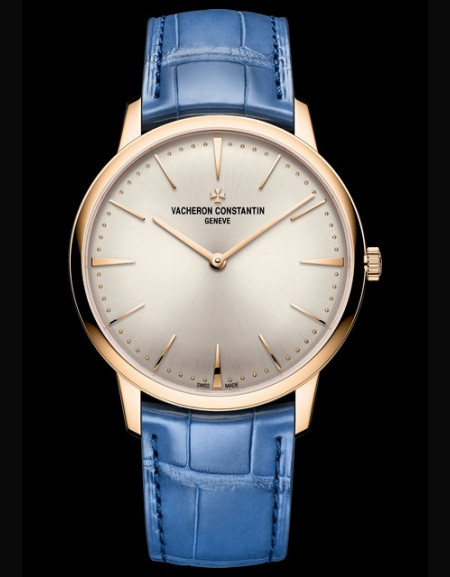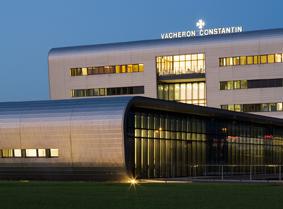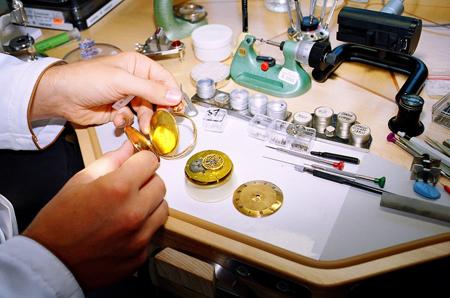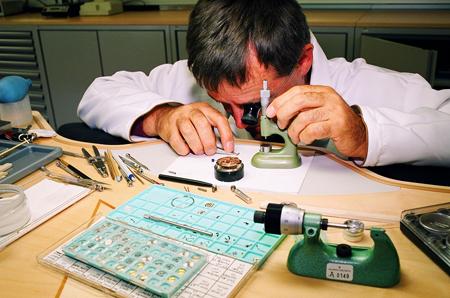1
vacheron_constantin

|
||
Vacheron Constantin history
1755: A tradition is born
In the middle of the 18th Century, in the city of Geneva, a young man called Jean-Marc Vacheron decided to open his own watch-making workshop. This exceptional craftsman founded a business that was to become, two and a half centuries later, one of the most renowned in the science of time.
1770: 15 years after its foundation, Vacheron Constantin creates its first 'complication' watches.
1779: First appearance of engine-turned dials at Vacheron Constantin.
1810: The grandson of Jean-Marc Vacher...

THE COLLECTIONS

-
Traditionnelle Perpetual...
SEE THE DATA SHEETBrand: Vacheron Constantin
Collection: Traditionnelle
Ref: 4305T/000G-H135
Price: 106 000 € -
Traditionnelle Perpetual...
SEE THE DATA SHEETBrand: Vacheron Constantin
Collection: Traditionnelle
Ref: 4300T/000R-H107
Price: 101 000 € -
Traditionnelle Perpetual...
SEE THE DATA SHEETBrand: Vacheron Constantin
Collection: Traditionnelle
Ref: 4300T/000G-H106
Price: 101 000 € -
Traditionnelle Tourbillon...
SEE THE DATA SHEETBrand: Vacheron Constantin
Collection: Traditionnelle
Ref: 4020T/000P-H038
Price: 76 000 € -
Traditionnelle Tourbillon...
SEE THE DATA SHEETBrand: Vacheron Constantin
Collection: Traditionnelle
Ref: 4030T/000P-H054
Price: 124 000 € -
Traditionnelle Tourbillon...
SEE THE DATA SHEETCollection: Vacheron Constantin
Ref: 6010T/000P-H055
Price: ON REQUEST -
Traditionnelle Tourbillon...
SEE THE DATA SHEETBrand: Vacheron Constantin
Collection: Traditionnelle
Ref: 6300T/000P-H056
Price: ON REQUEST -
Traditionnelle...
SEE THE DATA SHEETBrand: Vacheron Constantin
Collection: Traditionnelle
Ref: 82172/000R-H118
Price: 28 500 € -
Traditionnelle...
SEE THE DATA SHEETBrand: Vacheron Constantin
Collection: Traditionnelle
Ref: 82172/000P-H062
Price: 39 600 € -
Tribute To The Quest Of Time
SEE THE DATA SHEETBrand: Vacheron Constantin
Collection: Métiers d'Art
Ref: 7200A/000G-H103
Price: ON REQUEST -
Overseas Perpetual...
SEE THE DATA SHEETBrand: Vacheron Constantin
Collection: Overseas
Ref: 4300V/220G-H151
Price: 134 000 € -
Overseas Perpetual...
SEE THE DATA SHEETBrand: Vacheron Constantin
Collection: Overseas
Ref: 4300V/220R-H144
Price: 134 000 € -
Les Cabinotiers Solaria...
SEE THE DATA SHEETBrand: Vacheron Constantin
Collection: Cabinotiers
Ref: 9600C/000G-231C
Price: ON REQUEST -
Patrimony Self-Winding
SEE THE DATA SHEETBrand: Vacheron Constantin
Collection: Patrimony
Ref: 85180/000R-H116
Price: 37 900 € -
Patrimony Self-Winding
SEE THE DATA SHEETBrand: Vacheron Constantin
Collection: Patrimony
Ref: 85180/000G-H035
Price: 37 900 € -
Patrimony Moon Phase...
SEE THE DATA SHEETBrand: Vacheron Constantin
Collection: Patrimony
Ref: 4010U/000R-H117
Price: 57 500 € -
Patrimony Moon Phase...
SEE THE DATA SHEETBrand: Vacheron Constantin
Collection: Patrimony
Ref: 4010U/000G-H057
Price: 57 500 € -
Historiques 222
SEE THE DATA SHEETBrand: Vacheron Constantin
Collection: Historiques
Ref: 4200H/222A-B934
Price: 35 000 € -
Tourbillon – Ode to the...
SEE THE DATA SHEETBrand: Vacheron Constantin
Collection: Cabinotiers
Ref: 6040C/000G-157C
Price: ON REQUEST -
Tourbillon – Ode to the...
SEE THE DATA SHEETBrand: Vacheron Constantin
Collection: Cabinotiers
Ref: 6040C/000R-155C
Price: ON REQUEST -
Tourbillon – Ode to the...
SEE THE DATA SHEETBrand: Vacheron Constantin
Collection: Cabinotiers
Ref: 6040C/000R-152C
Price: ON REQUEST -
Tourbillon – Ode to the...
SEE THE DATA SHEETBrand: Vacheron Constantin
Collection: Cabinotiers
Ref: 6040C/000G-153C
Price: ON REQUEST -
Les Cabinotiers -...
SEE THE DATA SHEETBrand: Vacheron Constantin
Collection: Cabinotiers
Ref: 9890C/000G-151C
Price: ON REQUEST -
Les Cabinotiers -...
SEE THE DATA SHEETBrand: Vacheron Constantin
Collection: Cabinotiers
Ref: 9890C/000R-202C
Price: ON REQUEST -
Les Cabinotiers – Ode to...
SEE THE DATA SHEETBrand: Vacheron Constantin
Collection: Cabinotiers
Ref: 1420C/000G-162C
Price: ON REQUEST -
Les Cabinotiers – Ode to...
SEE THE DATA SHEETBrand: Vacheron Constantin
Collection: Cabinotiers
Ref: 1420C/000J-161C
Price: ON REQUEST -
Les Cabinotiers – Ode To...
SEE THE DATA SHEETBrand: Vacheron Constantin
Collection: Cabinotiers
Ref: 2400C/000G-160C
Price: ON REQUEST -
Patrimony Self-Winding
SEE THE DATA SHEETBrand: Vacheron Constantin
Collection: Patrimony
Ref: 85180/000J-H069
Price: 38 600 € -
Fiftysix Self-Winding
SEE THE DATA SHEETBrand: Vacheron Constantin
Collection: Fiftysix
Ref: 4600E/000R-H101
Price: ON REQUEST -
Vacheron Constantin...
SEE THE DATA SHEETBrand: Vacheron Constantin
Collection: Traditionnelle
Ref: 5100T/000P-H041
Price: ON REQUEST -
Vacheron Constantin...
SEE THE DATA SHEETBrand: Vacheron Constantin
Collection: Patrimony
Ref: 1410U/000R-H018
Price: 27 500 € -
Vacheron Constantin...
SEE THE DATA SHEETBrand: Vacheron Constantin
Collection: Patrimony
Ref: 1410U/000G-H017
Price: 27 500 €
Vacheron Constantin history
1755: A tradition is born
In the middle of the 18th Century, in the city of Geneva, a young man called Jean-Marc Vacheron decided to open his own watch-making workshop. This exceptional craftsman founded a business that was to become, two and a half centuries later, one of the most renowned in the science of time.
1770: 15 years after its foundation, Vacheron Constantin creates its first 'complication' watches.
1779: First appearance of engine-turned dials at Vacheron Constantin.
1810: The grandson of Jean-Marc Vacheron, Jaques-Barthélemy, takes the head of the family business and initiates the brand's first exports to France and Italy.
1812: First quarter-repeater watches. Creation of a collection of watches of six quarter-repeater watches. These watches strike the hours and the quarters upon request.
1819: The year of the motto
Jaques-Barthélemy, grandson of Jean-Marc Vacheron together with François Constantin creates the company name 'Vacheron et Constantin'. In this year on 5th July, François Constantin sends from Turin a letter to Jaques Barthélémy Vacheron containing the words that were to become the company motto: 'Do better if possible and that is always possible'.
1839: A new era in manufacturing
Georges-Auguste Leschot is taken on as production engineer in 1839 and proceeds to revolutionize watch-making techniques by adapting the pantograph to the requirements of his industry. With the use of that instrument, certain watch components can be copied repeatedly by a machine, and no longer need to be hand-made as before, thus propelling Vacheron Constantin to the forefront of the industrial age.
1872: First contest, first prizes
When the very demanding Geneva Observatory staged a precision contest for timepieces in 1872, Vacheron Constantin entered a number of its watches. The awards won proved to be the first in a long line of awards, records and prizes received.
1880: Appearence of the 'Maltese Cross' logo
Appearance of the 'Maltese Cross' symbol in the logo of Vacheron Constantin. This motif is taken from the shape of a component of the movement fixed to the barrel. Its use means that the number of wheels can be kept low.
1896: A medal and a distinction
At the Swiss National Exhibition held in Geneva in 1896, a prestigious gold medal was awarded to Vacheron Constantin in recognition of a range of outstanding achievements.
1906: Inauguration of the very first Vacheron Constantin boutique, which is still in the same place today in Quai de l'Ile, in Geneva
1935: Complexity
Creation of one of the most complex pocket-watches ever sold by Vacheron Constantin. This masterpiece, commissioned by King Farouk of Egypt, takes five years to make.
1955: Record thin timepiece
Precisely two hundred years after is foundation, Vacheron Constantin demonstrated that it had lost none of its creative verve and technical ingenuity. To mark the start of its third century of existence, the company's master watchmakers designed and built nothing less than one of the thinnest watches ever produced with a calibre only 1.64 mm deep !
Watches presented to presidents
In this year, the Big Four Summit Conference brings together in Geneva the heads of state N. A. Bulganin, Sir Anthony Eden, Dwight D. Eisenhower and Edgar Faure. At the request of some prominent Genevan citizens, Vacheron Constantin creates four wrist-watches as gifts to the Conference participants.
1972: International recognition
Vacheron Constantin presents a wristwatch with an astonishingly novel appearance, featuring an extremely daring design for the period. Paris awards the rare and highly coveted 'Diplôme du Prestige de la France' for this aesthetic accomplishment.
1994: In salute to a scholar
Gerhard Kremer (1512-1594), known as Mercator, was highly regarded as a mathematician and geographer due to his invention of the first navigational maps. Vacheron Constantin saluted the 400th anniversary of his death with the very limited production of a pair of watch designs. Their hand-enamelled dial featured Mercator's own maps of the hemispheres as well as a pair of compass-like watch hands invented and built specially for these timepieces.
1996: Vacheron Constantin introduced its highly successful Overseas sports line.The Richemont group acquired the entire share capital of Vacheron Constantin.
2003: The Manufacture launches 'Egérie', Vacheron Constantin's first collection for women.
2004: Opening of new Headquarters
The new headquarters and Manufacture Vacheron Constantin, located in Plan-les-Ouates, Geneva - in the aptly-named chemin du Tourbillon. Renovation of the historical headquarters of the brand: 'Vacheron Constantin House', containing an exclusive boutique, a patrimonial space and the workshop of the master watchmakers, dedicated to the various crafts of the watchmaker's art.
2005: 250 years of uninterrupted history
Vacheron Constantin, the oldest watchmakers in the world in continuous activity since it was founded in 1755, prepares to celebrate its 250 years of existence and creates the Tour de l'Ile watch. It is the most complicated double-faced wristwatch in the world, with a unique combination of 16 complications and astronomical dials. Its exceptional calibre of 834 components involves Vacheron Constantin's designers, engineers, constructors and watchmakers in more than 10,000 hours of research and development. It bears the prestigious Hallmark of Geneva. Seven of these timepieces are produced.
A world first
The Saint Gervais brings together a permanent calendar, a tourbillon and more than 10 days of power reserve in the same timepiece. Vacheron Constantin's new 2250 calibre assembles a permanent calendar, which with its four barrels extends the power reserve to 250 hours, coupled with a tourbillon mechanism and a permanent calendar. It bears the prestigious Hallmark of Geneva. Fifty-five of these timepieces are produced.
2006: 100 years of the Boutique
The very first Vacheron Constantin boutique celebrates its 100th anniversary. Inaugurated in 1906, it is still located 'en l'Ile', the brand's historic birthplace at the heart of Geneva, in the very same building that once housed the company's production workshops.
